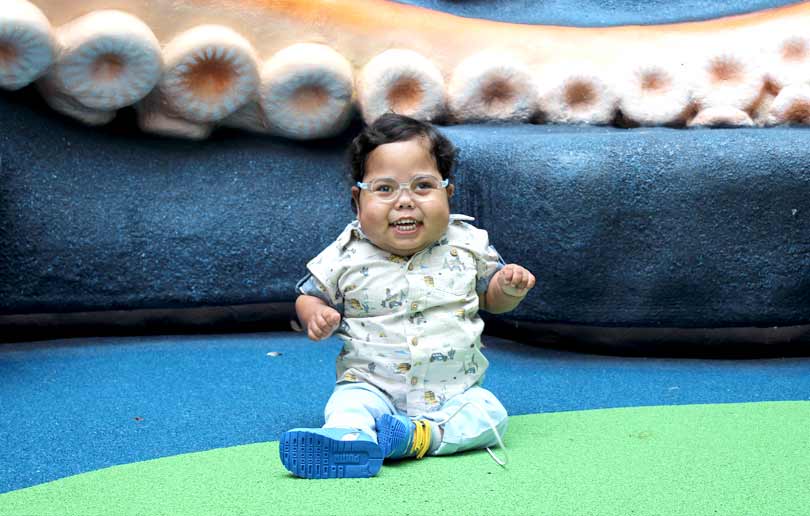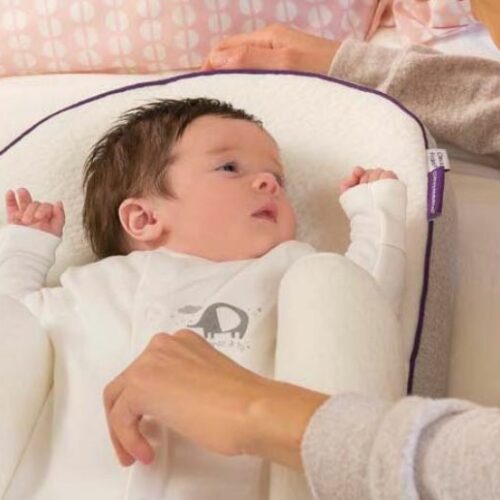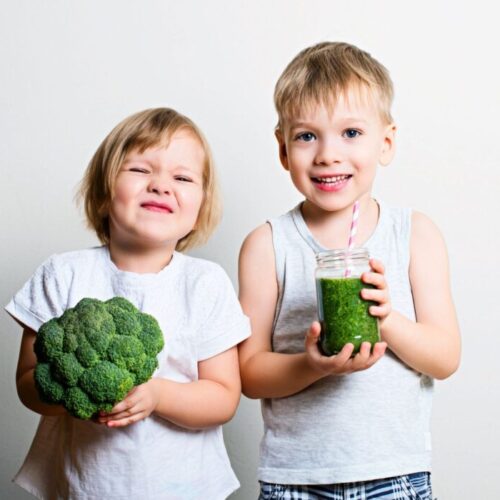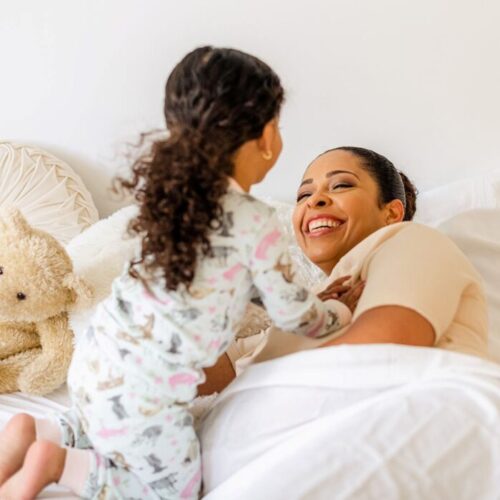Emirati-baby Omar revisits GOSH in London
Remember when we introduced you to the gorgeous Emirati baby Omar who has Shone complex; a rare congenital heart disease? Read Page 66 here to find out his story.

Omar recently visited Great Ormond Street Hospital for Children (GOSH) in London for a check-up, and this is what we found out about his progress:
Q: How is Omar’s recovery since the operation?
Omar’s recovery after the operation at GOSH was really good. We didn’t have this high expectation, so it really came as a miracle. We never expected him to be this good, considering the condition he has with his heart, his lungs, his gastrointestinal area and even his eyes. It just came to the point that he was the one who pulled everything together to be well.
For a long time, he was on oxygen. Prior to going back home, you know doing all the tests that they had done, even the sleeping study, to know whether he is oxygen is going low/lower while he sleeps, it is so good. He went really on a normal state. From the first test that he did, it was going low, the second test happened like November last year, and it was really, really good. His saturation was in a stable manner. He maintained everything that he needs when he sleeps.
It was a very good recovery considering what he has. So I am very happy, we are very happy, me and my husband are very happy going home. We are both well, we are both healthy and you know he needs more treatment but we never expected to go home without the help of the oxygen. He’s out of it and he’s just normal like a normal child.
Q: Why is he at GOSH now?
He’s at GOSH now because Dr Robert Yates, our lead doctor and our cardiologist at GOSH has regular clinics in Dubai and Abu Dhabi, so every three months we are lucky to see him there. At the last appointment in May, we met him and he was the one that said Omar’s due to come back to GOSH for another procedure, but this time it’s not as big as last year.
One of the parts of the hearts, the stent that they have kept inside his heart, needs to be diluted. This is because the pressure in the heart was getting bigger so they needed to do that, so that his pressure over his lungs will not be very big, and he will not have difficulty breathing. This is why we came back.
We also came back for the rest of the studies and the tests and the other procedures he needs apart from his heart. His lungs need to be tested again, his gastronomy (he’s fed through the gastrostomy), they needed to do an endoscopy again to check whether his stoma is in the proper place, and it’s not loose that it’s just good, that you know that he can survive with it for another year or so.
Q: How often does Omar visit?
Actually, so last year we were here for the whole year; it depends on Omar actually and what he really needs. Dr Yates told us we would need to come back every six months, so we need to be here twice a year, but it actually depends on Omar and how he is doing back home. He is currently being checked every 3 months by Dr Yates, so it’s whether he needs to come back before six months or three months. It all really depends on him.
Q: Some details about Omar’s eyes?
We had our consultation with Dr Henderson at GOSH just two weeks ago and they have tested Omar’s eyes again because, medically, Omar has hyperopia so he’s a far-sighted boy. He was diagnosed with retinopathy of prematurity because he was premature at 30 weeks. After one month, when they assessed him, they knew he had ROP. Doctors have treated that both at home and here, but here was the bigger surgery he had last year, where he nearly lost his vision over the right eye, they needed to save the vision in his right eye because his retina nearly detaching, so they needed to flatten it out, so he can save his central vision. And now they have checked him if there have been some improvements over his right and left eye because his right eye is lazy. So, he’s having a squint at the same time, so that’s why he is having an eye patch, and he is wearing glasses. We patch the strong eye, and keep the lazy eye open so you encourage the lazy eye to be more strong and look more centrally. So, he can focus more, so that’s my assignment going home.
So, when we came Dr Henderson tested him, his vision is stable. But they needed to change the glasses, because the prescription glasses needed more adjustment. He didn’t really improve, but he didn’t move backwards – his eyes are catching up well. We need more stimulation and practice for Omar’s eyes, e.g. colours and moving objects. He can focus and he can follow a lot more you know. He does, but he needs more stimulation. So yeah, his sight has improved, compared to last year.
He’s seeing a lot of things, he sees children, but actually back home he is at school, early years, so he’s been with the same age group, a little younger then him, but he’s enjoying them. I did this because I wanted him to improve his socialisation skills, so he’ll be more aware of his surroundings and with the same age group. He’s the only child so he doesn’t really have anyone to play with at home but us and his toys. Dr Henderson said we needed just to replace his eye glasses to a clearer one, so he can focus and he can be more sensitive, central and focused. And he’s growing. So, he needs to have a proper prescription glasses.
Q: His favourite toy?
From before, up until to now, his favourite toy is the shaker, the toys that really have good music sounds, with shaking movements that he can bump into together. He holds two toys together and then brings them together to make a noise. He likes shaking. He’s so interested in sounds and making more sounds, he loves dropping the toys and then looking at it.
He loves the sounds. When he throws the toy, and he looks at it. So, he loves the noises. He loves crinkly – the books that crinkle that’s what most he loves. And socially with the musical ones. He has a big piano at home, that he bangs and plays. You need to step on to make a sound. He uses his hands and coordination mainly. So, he usually uses those things to make sounds that he likes sound.
I hope he has a talent in music. When he was in my tummy, I used the green belly buds that plays music for the baby, it played classical music, like Mozart, I like it so much. He was stimulated when he was so young. So those are the toys he really loves, even now. I am praying that he will play more of the instruments.
Q: His personality?
He is a very adorable boy, very adorable, he’s very sweet, but at the same time he’s very sassy. Yeah, he is very sassy and cheeky, he is so cheeky and so smart. Considering what he has, I never expected him to be so good at playing and acting those nursery rhymes. He has a viewing time every day, so he gets one hour during the morning and the afternoon, so those nursery rhymes, especially the super simple learning songs, he was able to build those nursery rhymes that he can do it and following the movement, especially the wheels on the bus, head, shoulders, knees and toes, the emotional songs – happy angry sleep confused, the finger movements, the family finger songs. He knows all these.
I couldn’t imagine this. I was always praying that he could come up to the point he could follow, but I never imagined that he can follow. He knows his body parts. He will show you where it is. When he hears the music of wheels on the bus he will automatically move his hands over and over and just roll it out together.
He knows how to clap, he knows how to really smile at you and blow kisses. And then I taught him how to say please and thank you, which he really knows really well. So, when someone is giving him a favour, giving him something, when we ask him to say thank you, he blows kisses and gives hugs. He’s trying to…he’s so talkative, he utters a lot. He has learnt to drink.
So basically, he is really getting there and I’m really happy. He’s a very totally different boy now then last year. He’s making a big difference cognitively, socially. He has improved since last time he was here. It is a totally different Omar, he is more involved in his surroundings, he is more socialised to people around him. He’s just so good. That’s why people adore him so much. He gives back the emotions, like kissing and cuddles. he’s very bubbly, he’s a happy boy, considering what he has. I’m so blessed to have him. He’s really good.
Update from Dr Robert Yates, Consultant and Honorary Senior Lecturer in Paediatric and Fetal Cardiology at Great Ormond Street Hospital for Children (GOSH) in London
Omar came back from the UAE primarily to undergo a cardiac catheter intervention procedure. The stented valve that we had placed into the mitral position during his previous admission 18 months ago, was now too small as he had grown considerably during that time. During the catheter procedure, we planned to stretch open the stent with a balloon, thereby enlarging the valve but also potentially, risking making the valve regurgitant or leaky. The catheter worked well to open the valve with minimal regurgitation after the dilatation procedure and an improvement in his cardiac status.
Whilst he was here, he was also seen by a number of other professionals to attend to his complex needs and problems. He is now nearly ready to return home.
To find out more about GOSH IPP, please visit www.gosh.com.kw











Comments